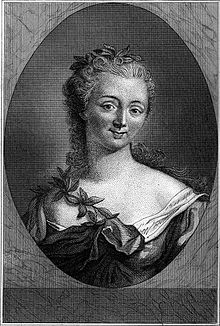They were supposed to proceed to Nice for Macaulay’s health, but she discovered a reason to stay in the capital, as she later told the Earl of Harcourt:
When I arrived at Paris the Physician to whom Mr. [Horace] Walpole recommended me said that I should certainly perish on the road if I attempted to go farther.Arnold later reported that the “agreable society” included the authors Anne-Marie du Boccage (shown above) and Marmontel, Madame Helvetius, Count Sarsfield, the Duc de Liancourt, the Duc de Harcourt, Abbé Seignelay Colbert de Castlehill, the British ambassador Lord Stormont, and the recently ousted government minister Turgot. (Plus a lady named “Madame Grigson” whom I couldn’t identify.)
Happily for me the Bark which I had before repeatedly tried in vain about a week after I was at Paris began to have so good an effect as to abate my fever sufficiently for me to partake of that agreable society.
As a British Whig, Macaulay expected to find the French capital under the oppression of an absolute monarchy. Instead, she heard a lot of people agreeing with her own ideas about republicanism.
I must tell your Lordship that after the French had paid me compliments on my genius and on my literary powers, the quality which they regarded as the next highest compliment was that I was a hater of kings.By “our civil wars,” Macaulay meant the British government’s conflict with the thirteen breakaway colonies in North America.
In regard to the part they take in our civil wars, they are all American mad; and I do assure you, my Lord, that even your Lordship would not be well received in France if you were not an American. All the enlightened French wish ardently to see a large empire established on a republican basis to keep the monarchies of the world in order; and all the vulgar have the same earnest desire, through hatred and jealousy of the English.
To be sure, Macaulay wasn’t seeing a cross-section of French society. She met mainly with progressive intellectuals and aristocrats who knew of her as an anti-government author in Britain. And as she acknowledged, even Frenchmen who supported the traditional order (“the vulgar”) saw a reason to support the new U.S. of A.—in order to weaken Britain.
There was one thing Macaulay couldn’t stand about France, however, and after a few weeks it sent her back to Bath:
it was sad necessity which drove me away; as my stomach was always unfortunately delicate, I nauseated from the first, tho’ I was prejudiced in its favor, at all the food I met with in France; their meat is carrion, their poultry and even their game insipid, and their cookery most detestable. They have no good sources to season their meats with, and they use them too sparingly; their made dishes are a collection of gravy drawn from bad meat, fat, &c., without over flavour but what a little onion gives; thus the stomach is loaded with everything which is baneful to it without the assistance of warm spices to help digestion; and, in addition to these mortifications, as my stomach was very weak after my illness, all their wines turned sour upon it.Macaulay thus found the French national constitution less oppressive than she expected, but her own constitution oppressed by French cuisine. Once again, her health was on a knife’s edge.
Thus all the juices of my body, vitiated by my long and important illness, was deprived of that nourishment which can alone restore the decayed strength and yield fresh balm to the oppressed constitution.
TOMORROW: A note to Dr. Franklin.

awesome post
ReplyDelete